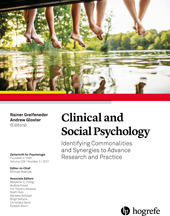Rejection Sensitivity in Intimate Relationships
Implications for Perceived Partner Responsiveness
Abstract
Abstract. The goal of the study was to investigate whether and how perceptions of rejection are predictive of perceptions of the partner’s responsiveness, and the intimacy felt with a romantic partner, daily. Moreover, we examined whether people who are more anxious and sensitive to rejection perceived more rejection in daily life and whether this foreshadowed perception of the partner to be less responsive. Analyses of daily data from a sample of 75 couples (N = 150) who reported on their daily relational experiences suggest that rejection sensitivity and rejection experiences play a significant role in couples’ felt intimacy in daily life, and specifically for perceptions of responsiveness. Results also indicate that for women, rejection sensitivity is associated with more rejection experiences. We discuss the current results from a clinical and from a social psychological perspective, and we highlight how anxious apprehension and experience of rejection, and its interpersonal consequences, can be further considered in clinical practice.
References
(2001). Rejection sensitivity and depressive symptoms in women. Personality and Social Psychology Bulletin, 27(7), 868–877. https://doi.org/10.1177/0146167201277009
(1999). Does rejection elicit hostility in rejection sensitive women? Social Cognition, 17(2), 245–271. https://doi.org/10.1521/soco.1999.17.2.245
(2007). Thwarting the need to belong: Understanding the interpersonal and inner effects of social exclusion. Social and Personality Psychology Compass, 1(1), 506–520. https://doi.org/10.1111/j.1751-9004.2007.00020.x
(1995). The Need to Belong: Desire for Interpersonal Attachments as a Fundamental Human Motivation. Psychological Bulletin, 117(3), 497–529. https://doi.org/10.1037/0033-2909.117.3.497
(2009). Rejection sensitivity and disruption of attention by social threat cues. Journal of Research in Personality, 43(6), 1064–1072. https://doi.org/10.1016/j.jrp.2009.07.007
(2013). Intensive longitudinal methods: An introduction to Diary and experience sampling research. Guilford Press.
(2005). The actor-partner interdependence model: A model of bidirectional effects in developmental studies. International Journal of Behavioral Development, 29(2), 101–109. https://doi.org/10.1080/01650250444000405
(2002). Marital quality, coping with conflict, marital complaints, and affection in couples with a depressed wife. Journal of Family Psychology, 16(1), 26–37. https://doi.org/10.1037/0893-3200.16.1.26
(1996). Implications of rejection sensitivity for intimate relationships. Journal of Personality and Social Psychology, 70(6), 1327–1343. https://doi.org/10.1037/0022-3514.70.6.1327
(1998). The self-fulfilling prophesy in close relationships: Rejection sensitivity and rejection by romantic partners. Journal of Personality and Social Psychology, 75(2), 545–560. https://doi.org/10.1037/0022-3514.75.2.545
(2017). Associations between rejection sensitivity and mental health outcomes: A meta-analytic review. Clinical Psychology Review, 57, 59–74. https://doi.org/10.1016/j.cpr.2017.08.007
(2020). The relationship between early maladaptive schemas and interpersonal problems: A meta‐analytic review. Clinical Psychology & Psychotherapy, 27(3), 408–447. https://doi.org/10.1002/cpp.2439
(2005). The interpersonal process model of intimacy in marriage: A daily-diary and multilevel. Journal of Family Psychology, 19(2), 314–323. https://doi.org/10.1037/0893-3200.19.2.314
(2001).
Toward a conceptualization of interpersonal rejection . In M. R. LearyEd., Interpersonal rejection (pp. 3–20). Oxford University Press. https://doi.org/10.1093/acprof:oso/9780195130157.001.0001(2006). Interpersonal rejection as a determinant of anger and aggression. Personality and Social Psychology Review, 10(2), 111–132. https://doi.org/10.1207/s15327957pspr1002_2
(2012).
The role of rejection sensitivity in people’s relationships with significant others and valued social groups . In M. R. LearyEd., Interpersonal Rejection (pp. 251–289). Oxford University Press. https://doi.org/10.1093/acprof:oso/9780195130157.003.0010(2014). Rejection sensitivity and depression: Mediation by stress generation. Psychiatry (New York), 77(1), 86–97. https://doi.org/10.1521/psyc.2014.77.1.86
(2020). Emotion Dynamics and Responsiveness in Intimate Relationships. Emotion, 20(2), 133–148. https://doi.org/10.1037/emo0000540
(2018). Rejection sensitivity and interpersonal behavior in daily life. Personality and Individual Differences, 126, 109–115. https://doi.org/10.1016/j.paid.2018.01.029
(2006). Optimizing assurance: The risk regulation system in relationships. Psychological Bulletin, 132(5), 641–666. https://doi.org/10.1037/0033-2909.132.5.641
(2013). Biased and Accurate: Depressive Symptoms and Daily Perceptions Within Intimate Relationships. Personality and Social Psychology Bulletin, 39(5), 636–650. https://doi.org/10.1177/0146167213480188
. (2018). nlme: Linear and nonlinear mixed effects models. https://cran.r-project.org/package=nlme
. (2015). R Studio. http://www.rstudio.com/
(2004).
Perceived partner responsiveness as an organizing construct in the study of intimacy and closeness . In D. J. MashekA. P. AronEds., Handbook of closeness and intimacy (pp. 201–225). Erlbaum.(2015). Responsiveness. Current Opinion in Psychology, 1, 67–71. https://doi.org/10.1016/j.copsyc.2015.01.001
(1988).
Intimacy as an interpersonal process . In S. W. DuckEd., Handbook of personal relationships (pp. 367–389). Wiley. https://doi.org/10.1016/0045-7825(81)90049-9(2010). Rejection sensitivity and the rejection-hostility link in romantic relationships. Journal of Personality, 78(1), 119–148. https://doi.org/10.1111/j.1467-6494.2009.00611.x
(2012). Expectancy effects on marital interaction: Rejection sensitivity as a critical moderator. Journal of Family Psychology, 26(5), 709–718. https://doi.org/10.1037/a0029444
(2007). Marital distress and DSM-IV psychiatric disorders in a population-based national survey. Journal of Abnormal Psychology, 116(3), 638–643. https://doi.org/10.1037/0021-843X.116.3.638



